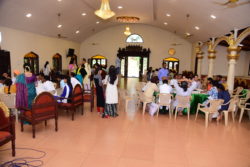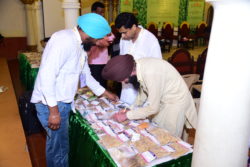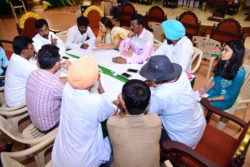Sustainable Seed Innovation 1.0
The University of Leeds, the Office for Sustainable Development of The Art of Living Foundation and the Max-Planck Institute for Innovation and Competition initiated the Sustainable Indigenous Seed Innovation project in 2017, with funding from the Arts and Humanities Research Council, UK. The first phase of the project aimed to answer the research question, how government policy in India – in particular, around intellectual property (IP) rights – can incentivize innovation with indigenous varieties of seeds and other propagating materials. Consequently, the research goals of the first phase were:
- Examining incentives for farmer-level seed innovations from indigenous varieties in India.
- Investigating the role of public recognition for farmers’ seed innovation in creating incentives.
Following extensive qualitative research undertaken by the post doctoral research associate, Dr. Natalie Kopytko during the first 9 months of the research grant period, the project culminated in a roundtable with various stakeholders to understand the challenges and needs of small and marginal farmers engaged in conservation and improvement of indigenous seeds and planting materials, from the grassroots level (the “Sustainable Seed Innovations 1.0 Conference”, or “SSI 1.0 Conference”). Interdisciplinary workshops fostered a rich interaction and discussion among farmer groups, government representatives, academics, NGO’s and intellectual property specialists.
The keynote address by the founder of the Art of Living, Sri Sri Ravi Shankar, as well as introductory talks by Dr. Prabhakar Rao (Trustee, Sri Sri Institute of Agricultural Sciences and Technology) and Rugmani Prabhakar (Head of the Office for Sustainable Development, The Art of Living) emphasized the importance of protecting heirloom, indigenous and traditional seeds (called Desi Beej in India) that are more robust in marginal environments and have greater immunity against local diseases and climatic shifts.
Following the introductory session, detailed presentations were made in the plenary session by Dr. Natalie Kopytko (University of Leeds), Prof. Gregory Radick (University of Leeds), and Dr. Mrinalini Kochupillai (Max Planck Institute) on their individual research, including trends in seed saving among farmers and how existing intellectual property protection regimes and associated policies are ill equipped to promoting sustainable seed innovations among small and marginal farmers. The presentations also identified government policies that, in their effort to promote high yields over and above all else, end up disincentivizing agrobiodiversity conservation, soil and water conservation.
Presentations on diverse issues were also made by Ms. Sunita K. Sreedharan (Lawyer and Patent Agent), Sanjay Maruti Patil (BISLD), Pitambar Shrestha (LI-BIRD), Dr. Kishore Kumar Sharma (Assam Agricultural University), Dr. Suman Sahai (Gene Campaign), Shamika Mone (OFAI) and Sanjay Khattal (National Seeds Corporation). The areas they covered included challenges and loopholes in the biodiversity law of India, and various on the ground challenges faced by farmer groups in India, especially those engaged in protecting and improving indigenous/traditional seeds using traditional, sustainable agricultural methods. Farmer groups from various regions of India (Bengal, Jharkhand, Karnataka, Rajasthan, Tamil Nadu, Uttar Pradesh, and New Delhi), academics, lawyers, NGOs and representatives of the Indian Government were present at the plenary session.
Due to the complex nature of the topic and the diversity of stakeholders involved, the challenge that the SSI 1.0 project & conference team needed to address was, how best to gather and integrate the different, but interconnected concerns and points of view. Indeed, the aim of the conference was not only to facilitate an interaction between experts from fields as diverse as biodiversity conservation, food security policy, ecological agricultural practices, seed policy and intellectual property law (as was done during the plenary sessions). The primary aim was to ensure that small farmer-entrepreneurs engaged in in situ agrobiodiversity conservation via the cultivation of traditional/indigenous seeds using traditional farming practices, participate and contribute actively, voicing their own ground level concerns. To facilitate this, the second half of the one day workshop divided all participants into four groups:
- Policy, Legal frameworks & Intellectual Property
- Participatory plant breeding,
- Outreach and awareness of indigenous seeds
- Importance of Research on sustainable seed innovation.
All groups identified current problems and collected recommendations for future actions to address/resolve these problems. A summary of the identified problems and recommendations emerging from each group is provided here in below:
The recommendations of the group “Policy, Legal Frameworks & Intellectual Property”, (moderator: Ms. Sunita K. Sreedharan, Lawyer and Patent Agent) were found to broadly fall under the following categories:
- Inadequate attribution and recognition given to innovative farmers and farmers’ communities, especially those engaged in saving and improving not just indigenous seeds, but also associated indigenous/traditional, sustainable and cost effective methods of seed storage, soil health management etc.
- No traceability of source of seeds and information. The farmers said that their improved varieties must be given names and these names must be recorded somewhere, together with basic characteristics of seeds (including history of where the seed came from, physical size, morphology, maturation period, diseases linked with its cultivation, or those that are avoided by their cultivation) such that anyone who buys them knows the source and attributes of the seeds. The names given to the seeds by farmers must be registered in the government seed portal or in any other centralized system. Farmer Producer Organisations (FPOs) must be created and FPOs must name the seeds emerging from any community of farmers. It was also recommended that in the absence of a tracing (to source) mechanism/system, farmer to farmer seed exchanges and exchanged seeds within farmers should be documented on blank papers with details as to time, date of sale/exchange, amount of seed given, sellers and buyers’ name etc. The farmers considered this to be necessary in order to claim royalties in the future (e.g. from those using/multiplying their seeds) and have an additional source of income.
- Documentation of Traditional Knowledge: The group emphasized the relevance of documenting the traditional knowledge associated with every cultivated indigenous seeds (e.g. germination time, methods of cultivation for best results etc.)
- Inadequate availability of affordable, good quality indigenous seeds for use in traditional, sustainable farming systems was identified as a major problem. The group concluded that more FPOs need to be formed in order to guarantee the availability of affordable, high quality indigenous seeds.
- Lack of effective communication and marketing channels: The group found that the help of the District Magistrate may be necessary in setting up mandatory marketing channels to distribute organic products of indigenous seeds, for e.g. by reserving spots for organic produce in various shops.
- Cost differential between organic and non-organic and low shelf life of organic food in shops prevents indigenous seeds from becoming more popular.
- Testing Labs to certify organic products needed in village level in order to ensure the quality and prevent the misuse of indigenous seeds and organic brands.
The group “Importance of Research on Sustainable Seed Innovation”, (moderator: Dr. Mrinalini Kochupillai, Max Planck Institute for Innovation & Competition), found that research is of central relevance to test, validate and increase the value, demand and interest in indigenous seeds and food resulting therefrom. Research is also needed to support and advance in situ (and ex situ) conservation efforts. Research is necessary not only to check/validate claims associated with indigenous seeds, but also to support nutritional security. For example, if a local variety of wheat is traditionally known to be rich in iron, research confirming this attribute would help bring knowledge about the benefits of the wheat to anemic people, helping them address their health problem, while also increasing the demand for the wheat and therefore, the farmers’ income. In addition to studying specific claims, broad based research also needs to systematically study the nutritional content (micronutrient content, quality, and yields of produce/grains resulting from the use of traditional/indigenous seeds and associated farming practices. All research efforts would help increase the value and demand of traditional seeds and food produced therefrom. In addition to these general research needs, the workshop participants identified the following areas in which research efforts need to be intensified to study:
A. Biological Research
- Inherent pest resistance of traditional versus conventional seeds
- Medicinal properties of local, indigenous grains
- Impact of traditional ecological knowledge based soil management systems on ecosystem services, plant health, yield, farmer profit margins etc.
- Genetic studies on indigenous seeds, including study of active molecules and active ingredients in indigenous varieties, as well as interaction between these active molecules and ingredients in natural conditions;
- Impact of chemical / conventional farming on yield of traditional/indigenous seeds over time
- Scientific guidelines for in situ seed conservation and improvement
- Study on impact of traditional seed storage methods on seed viability
B. Mechanical Research
- Development of small and affordable machines such as processors, mixers, harvestors, water extraction machines, machines supporting traditional seed and grain storage methods, that can support the work of small farmers engaged in traditional knowledge based farming using indigenous seeds
- Methods and machines to promote local processing of foods and other materials emerging from TEK based farming using Desi Seeds.
- Low cost machines for bottling and vacuum packing at rural level
C. Comparative field research
- Research on field comparing yield from conventional farming using uniform/‘improved’ seeds versus traditional knowledge based agriculture using indigenous/heterogenous seeds;
- On field research to see if current cultivation practices associated with any traditional/indigenous seed are equally applicable in all conditions and situations and what changes are needed for specific local conditions to give best results;
- Research and innovation in the finished product sector using unusual, unique produce and cereals cultivated using traditional/indigenous seeds;
- Creation of recipe books using local, indigenous foods, which provide well researched details such as cooking time, storage tolerance, whether soaking, sprouting etc. is recommended and with what effect.
D. Social Sciences Research
- Determining means of making certification (safety related, organic certification etc.) more affordable and accessible to small farmers and farmer communities
- Means of changing (negative) perceptions associated with traditional farming and indigenous/heterogenous seeds
- Developing efficient marketing models and compilation of best practices
- Developing research methods that can appropriately incorporate farmers’ observations into scientific research
- Historical and cultural research to study the linkages between specific crops and festivals or occasions such as weddings, child birth etc.
- Historical research into farming systems and practices that existed before the green revolution (revival of ‘lost’ traditional knowledge)
- Research on intellectual property rights and means of incentivizing in situ agrobiodiversity conservation and sustainable seed innovations such that economic benefits reach farmers and farmer communities without eroding local cultures such as cultures of seed sharing.
E. Education
- Re-thinking existing educational curriculums (e.g. in schools, universities, agricultural extension services etc.)
- Education for value added product development linked with traditional seeds and produce/cereals resulting therefrom, including packaging, preservation etc.
The group “Outreach and Awareness of Indigenous Seeds”, moderated by Shamika Mone (OFAI), identified lack of incentives for engaging in traditional farming as well as lack of knowledge necessary to start the journey, as major problems. The group identified the need to support the creation of knowledge (associated with traditional farming) and its widespread distribution. Various recommendations were made to sensitize farmers and the general public about the importance of indigenous seeds (and traditional, sustainable farming systems). These included the introduction of new educational curriculums in schools, universities, activating and (re)orienting public distribution systems, and activating biodiversity committees to ensure not just the prevention of biopiracy, but to promote active on the ground, in situ agrobiodiversity conservation and improvement efforts. The findings of the group emphasized that community involvement would not only promote the revival of TEK, but could also foster development of local markets and employment opportunities through e.g. festivals with focus on local food and seeds. The group also recommended the involvement of celebrities and spiritual leaders to raise awareness and increase public involvement in traditional, sustainable farming using indigenous/heterogeneous seeds. The group recommended that in the short term, a starting point to create knowledge would be the documentation of success stories to spread motivation within farmers. Different types of media, such as films, web-portals, social media, magazines and books, could promote the effectiveness and reach of spread knowledge of indigenous seeds and their properties.
The group “Participatory Plant Breeding”, (moderator: S.C. Triphathy, Head of the agriculture department, Art of Living Foundation), emphasized the importance of the traceability of indigenous germ plasms from farmers’ fields to varietal crop breeding programs. Ideas, that were proposed included support and funds for research, documentation of research and knowledge creation and further dissemination of seed material. In addition to these general proposals in the field of participatory plant breeding, the workshop participants recommended to focus efforts in the following areas:
- Documenting the soil condition to discover changes and derogations to counteract in time and prevent soil degradations (erosions, loss of fertility, etc.)
- Maintaining a certain distance between different breeds of crops
- Testing the characteristics of seeds, including Tagging (noticing the nutrient level in grains) whereby a standardization frame could provide help to document the results
- Roughing the not so good quality of seeds
- Signing of a Memorandum of Understanding by the Government with the farmers so that the farmers can transfer seeds only under certain conditions
The roundtable event enhanced the understanding of the value creation in farmer innovation. The gathering of the different stakeholder revealed the requirement of a documentation system as the biggest challenge. Such a system was considered necessary to ensure traceability to the origin of seeds. Without traceability to source, a reward/royalty systemcannot be established, and farmers cannot benefit from the multiplication and distribution of their seeds. Well documented knowledge creation and traceable channels of dissemination of knowledge would support knowledge creation and also the wider dissemination of seeds. A better documentation would counteract the erosion of TEK, especially if this knowledge is directly integrated in education. Education is a crucial recommendation prong that should foster public education and growers training, simultaneously (e.g. through extension services).
Further benefits, also on an economic perspective, could comprise government schemes and subsidies for innovation, distribution and the in situ conservation of indigenous seeds. The establishment of market structures for indigenous seeds could provide further monetary value that promotes farmer innovation and products would contribute to a rising awareness of customers.
The outcomes of the conferences were presented as recommendations to the Indian Government.
Thank-you to the following participants for making this event a success:
Sanjay Khattal (National State Seed Corporation and representative of the Government of India - GoI)
Ankush Bhalekar (Advisor to the Government on Natural Farming)
Sunita Sreedharan (Advocate)
Dr. Suman Sahai (Gene Campaign)
Dr. Kishore Kumar Sharma (Assam Agricultural University)
Sanjay Maruti Patil (BAIF)
Pitambar Shrestha (Li-BIRD)
Shamika Mone (Organic Farming Association of India)
C.S. Triphany (Art of Living Foundation)
Umendra Dutt (Kheti Virasat Mission)
Ruchi Jain (Art of Living Foundation)
Yash Mishra
Udayakumar Kollimath
Nagaraj Ganguli
Kishore Mukherjee
Amarjit Sharma
Gulab Singh
Pankaj Pathak
Raspinder Singh
Santosh Kumari
Arun T.
Ajit Paul
Chanchal Biswas
Mahadev Ramkrishna Gomare
Dinesh Gurjar
Jay Prakash Singh
Ranjit Kumar Singh
C.P. Krishna
K.C. Krishna
S.B. Somshekar
Dandiram Dinker Madane
Satish Punja Kanawade
R. Sriram
Perumal R.
